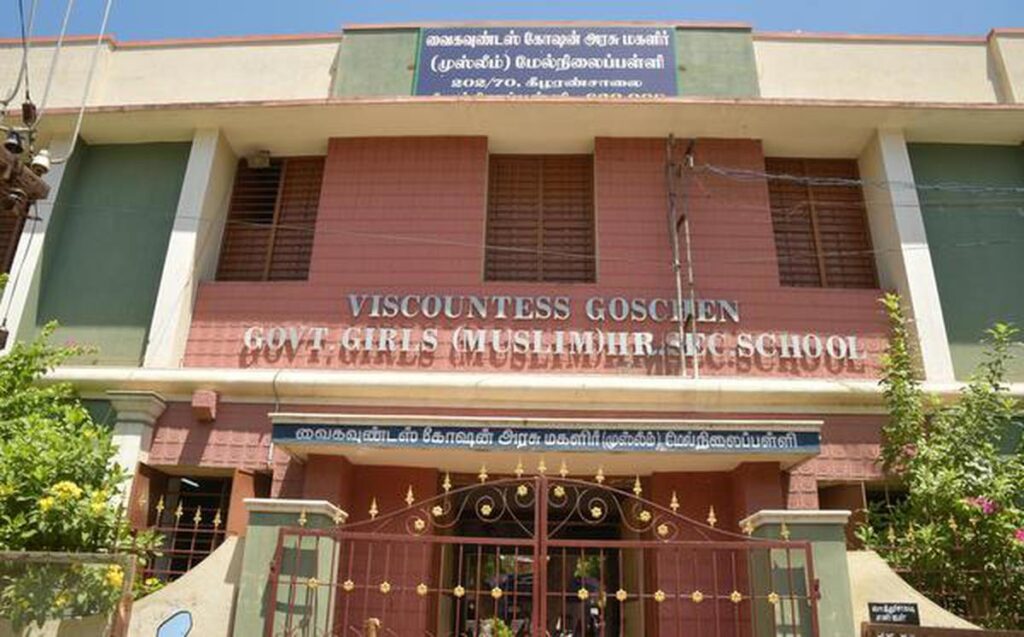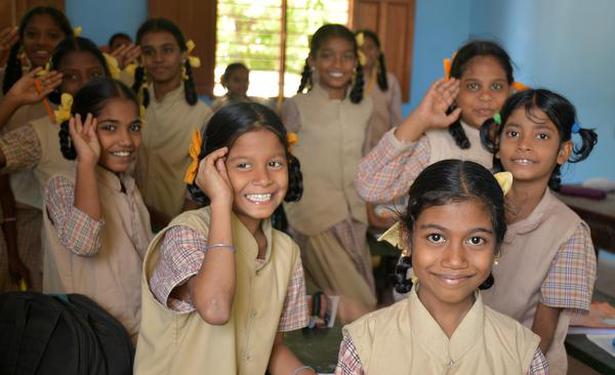Trichy, TAMIL NADU :

Tiruchi’s Viscountess Goschen Government Girls (Muslim) Higher Secondary School has been functioning through highs and lows for over a century
As the bell announces the lunch break at the Viscountess Goschen Government Girls (Muslim) Higher Secondary School (VGGGMHSS) in Tharanallur, East Boulevard Road the aroma of freshly cooked food wafts through the campus and children stream out from the classrooms to get their fill.
It may seem like a regular day at a regular school, but the story of the 110-year-old institution, one of two managed by the State Government for Muslim girls, resembles that of the Phoenix, a mythical bird which keeps rising from the ashes of its predecessor.
The Hobart School for Muslim Girls (now known as Government Hobart Higher Secondary School) established in the 1870s in Chennai, is the other such institution.
The Urdu-medium school in Tiruchi, founded in 1910, was named after Lady Margaret Evelyn Gathorne-Hardy, the wife of British parliamentarian and former Governor of Madras Viscount George Joachim Goschen.
The model school attached to the Viscountess Goschen Teacher Training Institute was converted to a secondary school in 1939-40. It was upgraded to higher secondary in August 2018.
The school conformed to the Muslim community’s requirements of segregated education with a modern syllabus and separate religious instruction with the aim of improving the lot of girl children who would otherwise be denied schooling and married off at an early age.
“In its heyday, the school had up to 1,000 students on its rolls, with children coming from Beema Nagar, Varaganeri, Palakkarai, Nathershah Wali Dargah, Tennur, Woraiyur, Khaja Malai, Pon Malai in Tiruchi and other places in the Madras Presidency where Urdu was in prevalence, to study here,” says B Indrani, the school’s headmistress.
Islamic heritage
Housed in a building that had previously served as a prison, VGGGMHSS is squeezed in between the Jail and Bandekhana Streets of the busy commercial area behind the Gandhi Market.
In the olden days, when the purdah system was in observance, burqa-clad Muslim girls would travel in horse and bullock carts that would be fitted with cloth curtains to veil them from public view. The back gate (now no longer in use) was designed to allow the carts to reverse directly into the school compound to maintain privacy.
“Once they were inside, the purdah rule would be relaxed, but the campus remained off-limits to men,” says Indrani.
Many prominent Muslim families, even those whose mother tongue was Tamil, sent their children here, because of its safe environment.
_________________________________________________
Colonial roots
- George Joachim Goschen, 2nd Viscount Goschen, was born on October 15, 1866 to George Joachim Goschen, 1st Viscount Goschen and Lucy Dalley.
- He was the Governor of Madras Presidency from 1924 to 1929, and was made Viceroy of India in 1929.
- Under his patronage, The Madras Presidency Radio Club started the city’s first radio transmission in 1924, which continued until 1927.
- He was also involved in the early stages of the Loyola College, Chennai and presided over its first college day in 1928.
- He also presided over the diamond jubilee of newly named Bishop Heber College in Tiruchi (formerly known as Society for the Propagation of the Gospel or SPG College) in 1926.
- The British parliamentarian married Lady Margaret Evelyn Gathorne-Hardy in 1893, against his parents’ wishes, because she was 8 years senior to him.
- As a result of her marriage, Lady Margaret was styled as Viscountess Goschen on February 7, 1907. The couple had three children.
- Her name adorns some of the oldest public institutions in southern India. Besides the school for Muslim girls in Tiruchi, the Government Lady Goschen Maternity Hospital in Mangaluru is also named after her. The Germanic sounding surname is often mispronounced as ‘Ghosha’ or ‘Cosen’ in India.
- Viscountess Goschen passed away in 1943, while her husband died on July 25, 1952 at the age of 85.
_______________________________________
Slow decline
The school’s fortunes suffered a setback after independence as English and Tamil gained precedence in Tamil Nadu’s education policy, and Urdu waned in the wake of the abolition of the princely states. The lack of higher secondary schooling in Urdu medium was another disadvantage.
By 2006, the school had only 2 students, and 5 teachers, with classes being held at the office of the Headmistress. Local authorities built hostels for students from minority and backward communities on a part of the campus, shrinking the school’s dimensions considerably and edging it towards closure.
Saved by the public
Thanks to the efforts of concerned educators and social workers, VGGGMHSS came back from the brink from the mid-2000s.
“In 2007, 19 Muslim business establishments in and around EB Road united to save the school by canvassing for admissions within the local community. But when the response was poor, they brought 25 students from Karnataka,” says V M Habibullah, managing trustee of the NEED Trust that runs a free hostel for VGGGMHSS students. Habibullah is also actively involved in Goschen School Development Committee, an ancillary body of the Parent-Teacher Association (PTA) that has played an important role in the school’s revival.
VGGGMHSS today has 314 children; it offers Urdu medium only from Class 1 to 5, with an option to switch over to Tamil or English from Class 6 to 12. Despite its precarious state, the school has maintained a consistent full pass rate in the annual examinations.
With most of the students coming from socially disadvantaged backgrounds, the school’s PTA gives them free breakfast and transport. It also organises Deeniyat or religious classes for girls from Class 1 to 9 in the evenings. VGGGMHSS has been under the noon-meal scheme of the Government from 2009. “We want our children to be proud of their school, and show them that education can lead the way to a great future,” says Indrani.

New issues
Among the challenges VGGGMHSS faces is the problem of encroachments by shanty dwellers, who have used the school’s compound wall along the Jail Street to set up at least 45 hutments.
“The windows of our classrooms overlook people’s living quarters instead of the open street,” says Habibullah.
“Children are often distracted by what they see during the class hours, and it’s not conducive to learning.”
Despite petitioning the local authorities in 2013, not much has been done to remove these illegal structures, he added.
A prayer hall has been sectioned off into classrooms, but as the school’s student population grows, at least 10 more rooms will be required to accommodate the new intake, says PKM Abdul Samad, Treasurer of the PTA, VGGGMHSS. “At the current market rate, this would involve an investment of at least ₹40 lakhs. We are hopeful of the city’s philanthropists helping us out.”
source: http://www.thehindu.com / The Hindu / Home> Education / by Nahla Nainar / August 02nd, 2019








